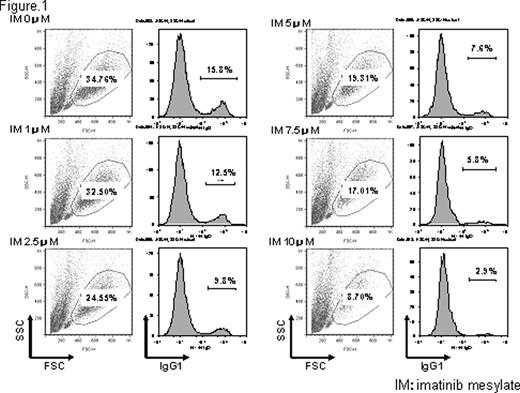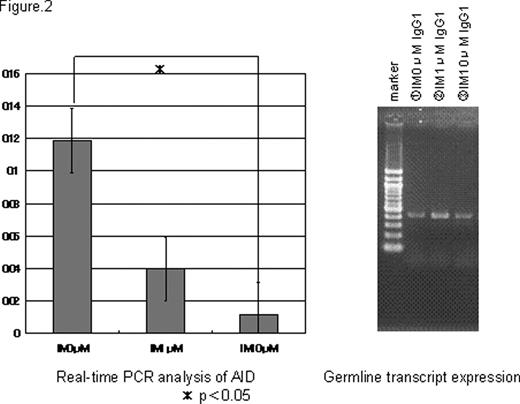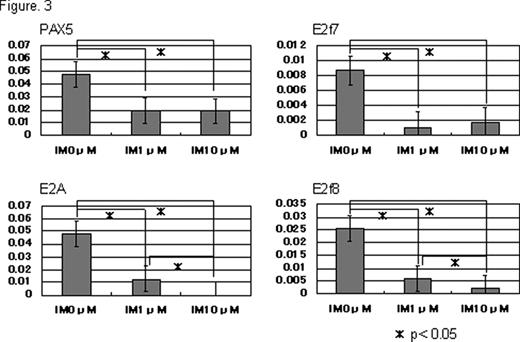Abstract
Abstract 3424
Activation-induced cytidine deaminase (AID), is essential for class switch recombination(CSR) and somatic hypermutation(SHM). Deregulated expression of AID acts as a genomic mutator that contributes to various tumorigenesis through chromosomal translocation and aberrant SHM. Previously, we showed that the titer of serum immunoglobulin(Ig)G and IgA in the CML patients treated with imatinib mesylate was lower than in those with interferon-ƒ¿, whereas that of IgM was higher, implying that imatinb mesylate, the abl kinase inhibitor, impairs CSR.
Here we explored the effect of imatinib mesylate on CSR both in vitro and in vivo and revealed that AID was responsible for the impairement of CSR by imatinib mesylate.
CSR is induced in the mouse splenic B cells by stimulation of IL-4 and LPS. In this system, IgG1 expression of spleen cells without imatinib mesylate was □‘15%, whereas that with 10ƒÊM imatinib mesylate significantly reduced to □‘3%. The reduction was observed in dose dependent manner (Figure.1). Imatinib mesylate has been reported to affect various immunomoduratory cells including dendritic cells and T cells. Our observation elucidated that imatinib mesylate has a direct effect on B cells.
Next, the expression of AID and the germline transcript of IgG1, which are required for CSR was examined by use of PCR. The expression of AID significantly decreased with imatinib mesylate, whereas that of the germline transcript of IgG1 did not change with and without 10 ƒÊM imatinib mesylate (Figure.2). Since the germline transcript of IgG1 remained unchanged, it was elucidated that downregulation of AID causes the inhibition of CSR by imatinib mesylate. The similar results were obtained in the experiments where the mice injected SRBCs (a immunogen) with imatinib mesylate showed significant reduced CSR and expression of AID in the spleen.
Furthermore, we investigated whether exogenous expression of AID could rescue the inhibition of CSR by imatinib mesylate. IgG1 expression in the spleen cells without imatinib mesylate was about 36%, whereas that with 10 ƒÊM imatinib mesylate reduced to about 10.2%. When AID was exogenously expressed, IgG1 expression with 10 ƒÊM imatinib mesylate reincreased to 46.2%. It was clearly documented that the reexpression of AID could almost completely cancel the effect of imatinib mesylate on CSR.
Finally, trying to understand the mechanism of downregulation of AID, the expressions of the key transcription factors, such as PAX5, E2A, E2f7 and E2f8, which bind Aicda promoter region, were examined by use of the quantitative PCR. Surprisingly all of these transcriptional factors were downregulated by imatinib mesylate. Especially the expression of E2A was dramatically reduced by imatinib mesylate. E2A is the crucial transcriptional activator for AID expression, suggesting that the remarkable downregulation of E2A by imatinib mesylate may lead to the downregulation of AID expression.
Taken together, these observation lead us to the conclusion that suppression of AID via E2A is responsible for inhibition of CSR by imatinib mesylate.
Our findings shed light on the etiology of hypogammaglobulinemia, an adverse effect of imatinib mesylate frequently observed in the clinical settings. The assessment and close examination of the adverse effects of the kinase inhibitors is important for the future treatment for BCR-ABL leukemias, because the treatment by multiple tyrosine kinase inhibitors like tuberculosis and HIV infection is assumed to be introduced in order to overcome the problem of drug resistance induced by the mutation such as T315I or other.
It is also suggest that imatinib mesylate is the potential drug for clinical usage as AID suppressor, which deregulation of CSR and SHM with the genomic instability is observed in many B cell malignancy.
No relevant conflicts of interest to declare.
Author notes
Asterisk with author names denotes non-ASH members.




This feature is available to Subscribers Only
Sign In or Create an Account Close Modal